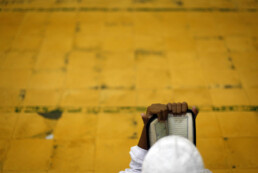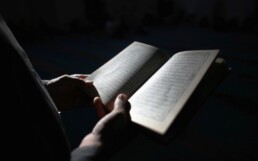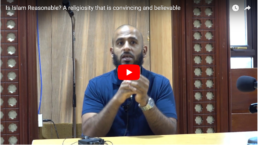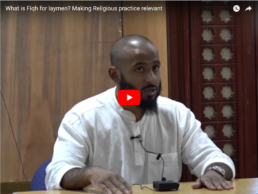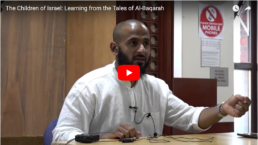Tarawih and "Carnal desires"
Recently, it was brought to my attention that there are men who hold prominent positions in their ethno-religious communities, espousing bizarre views on the tarawih prayer by misusing verses of the Qur'an. They apply the verse: “but there came after them generations who neglected prayer and were driven by their own desires. These will come face to face with their evil, except those who repent, believe, and work actions of righteousness…” (19:59) to those who offer 8 units of prayer in congregational tarawih to then return home whilst others remain to offer 20.
They misuses the words of God the Most High where He clearly did not intend what they claim. Ironically, they claim to champion ‘traditionalism’ yet mischaracterise what God has revealed in the same way as those they rabidly criticise. Whilst I do not personally know of, nor engage, this small cohort or the teacher who espouses this strange application of the verse, blatant misuse of God’s words for banal sectarian purposes is morally wrong and despised by God. “As for those who have divided their religion and broken up into factions, have nothing to do with them. Their case rests with God: in time He will tell them about their deeds.” (6:159)
I hold nothing personal against anyone and seek good will towards all, but very simply, we emphatically know God was not speaking about tarawih, and advocating such a thing, or applying it to tarawih, is deeply wrong. Thus I write this as a clarification and without any desire to engage in futile argumentation - it is particularly for those who have asked me about the (mis)use of the verse.
So to some brief points:
1. I really believed we were past the whole 8 vs 20 rak’at wars. The inanity of the battles that raged in the past decade, particularly between some Salafi and Deobandi groups, had little intelligence to it, absolutely no benefit ever came from it - not by way of godliness nor worship, and anybody who engages in such binary polemics simply exposes their deep ignorance of God's law. To attempt to reignite such pointless argumentation, and especially over optional prayers, evidences a questionable level of maturity (both psychological and religious).
2. “There came after them generations who neglected prayer” refers to disbelieving generations that came after Noah, Abraham and Israel (Jacob), when godlessness prevailed where people disbelieved, abandoning the prescribed prayer and subservience to God, and instead took to evil desires. Verses 41-60 clearly contextualise all of this, and even with all of the polemics of the near-past, I have never heard anyone distastefully resort to applying this verse for such sectarian purposes. It is essentially to apply a verse on disbelievers to worshipful believers!
3. For those who only see validity in what was said by scholars of the medieval period: I have yet to come across a past scholar using this verse in such an overreaching way and applying it to those who offer less or more than 20 rak’at. So unless I’ve missed something substantial from the tradition (which I’m open to), is this a new interpretation?
4. As a scholarly point, I fully affirm the use of epistemic analogies (qiyas ma’nawi) as a variable (qarinah) in determining divine intent, but the gentleman’s incoherent method has taken an ontological point on mandated prayer and applied it to matters related to legal reasoning around optional prayers. It's a fallacious analogy which has resulted in a profoundly erroneous deduction.
5. The message is clearly overdramatised: people do not ‘run off’ after 8 as if committing a crime, nor do they ‘abandon the masjid’ as if it was obligatory to be there in the first place. They simply leave to return home. To assert that doing so is to give in to ‘lustful carnal desires’ is to daftly portray active and sincere worshippers of God, who’ve just stood before God, as leaving the mosque for the whorehouse! (Perhaps he doesn’t know what ‘lustful carnal desires’ means?) Evidently, all of this hyperbolic language is misapplied from the verse which is speaking of something else. Regardless of the legal disagreement, the absence of reason and rationality in the vitriol and the unashamed sectarianism should speak volumes to those who might take such approaches to understanding what God wants as legitimate.
6. There is very little legal understanding in such vitriol. Nights are very short which leaves little space to moderately consume the sustenance the body requires, the rest required to get through 18+ hours of fasting which for many is spent at work, and this doesn't even take into consideration sexual needs. To offer optional prayers despite all of these needs is highly admirable, no matter how many the units.
There are other pertinent points, but for brevity I’ll leave it there.
As a side note: what might be of real benefit to worshippers is to address the way in which 20 rak’at is often performed: unintelligible Qur'anic recitation and hasty movements that resemble little more than bodily jerks. In the quest for numbers that God didn’t stipulate, excellence and heartfelt subservience which God did stipulate are greatly ignored.
May God guide us to what He finds most pleasing and worthy, overlook our shortcomings and weaknesses, and graciously accept the imperfect little acts that we offer.
Note: Please do not waste your day/night posting narrations and arguments about any number of rak’ats for tarawih, God is more impressed if you instead spend that actual time in prayer itself.
Thoughts on Ramadan: Food, Tarawih, and Qur'an
An impromptu lecture delivered at Kingston Mosque last year on some key issues around Ramadan.
Easing religious hardship, but how?
Across all spectrums of the religious scale, it is held by most that the religious principle of making things easy requires curbing aspects of the shari'ah. Of course, in many instances it does, but it is not a necessary given. The understanding that ease requires some sort of cutback has become axiomatic, even those who doggedly refuse any notion of moderation – usually of the literalist kind – take the hadith to be a reference to legal concessions (rukhas). This tends to be due to the widespread religious culture of viewing most things, including religious ease and hardship, only through a legalistic (fiqhi) lens.
There was no black ‘contribution’ to Islam
It’s bold to claim there is no such thing as a black ‘contribution’ to Islam, and perhaps intentionally provocative, but for good reasons that I’ll point out later. Rest assured, this article certainly doesn’t mean to negate a shared Muslim story, but actually to confront the implicit way black Muslims are often regarded as fringe associates rather than inherent fellows.
Why scholars are withdrawing from the community
The first rule for those in Islamic scholastic training, especially that of a philosophical nature has always been to cultivate the ability to leave emotionally charged rhetoric at the door. Whilst this remains incredibly challenging for most self-styled clerics, genuine thinkers demonstrate such aptitude – to maintain disapproval of certain ideas whilst dealing with them in a systematic and impartial fashion. Such is the mode of philosophical enquiry that has been held high, both in eastern and western forms of thought. David Hume, perhaps the greatest philosopher to write in the English language lamented of hollow rhetoric, ‘Disputes are multiplied, as if every thing was uncertain; and these disputes are managed with the greatest warmth, as if every thing was certain. Amidst all this bustle it is not reason, which carries the prize, but eloquence…’
However, this aptitude is greatly unappreciated. There is a pettiness about expertise and scholarship that exists amongst western Muslims that has gotten foolish and immature. Many amongst the laity disregard the station of actual learning, demoting the educated whilst propping up everyone else. There was once a time amongst believers, when public engagement required a level of technical knowledge, scholastic ability, and a decent command of language. Ideas would be articulated intelligently, contentions to those ideas would warrant a decisive but affable response; scholars would be expected to defend their views and accept being called out for inaccuracies. But now we seem to live in a time when anyone can crowd the field of slogans with inanity. Rather than being instructed, laymen are pandered to, producing a delusion of intellectual adequacy in the form of compounded ignorance (jahl murakkab), which says that you are ignorant but you stoutly believe otherwise. This misplaced confidence merely empowers people who refuse to believe there are specialists who might contradict them, nonchalantly dismissive in order to maintain an immoderately high regard for their own intellects and partisan viewpoint. For them, no one is considered an actual scholar, and so, everyone despite their varying degrees of learning is very much equal. This is not only a rejection of knowledge but also the sophisticated system of gaining knowledge, the effort put in, the notion of exploring and weighing knowledge, and developing ideas for practicable ends.
A superficial approach to determining authority
We are caught in a warped paradigm, where on one hand we continue as if there aren’t any seriously qualified personnel but then on the other accede to the reality where YouTube validates everyone’s credentials; a Qur’an reciter with a nice voice is somehow a theologian, an impassioned evangelist suddenly becomes a legal specialist. It is this superficial approach to determining our authorities that brings about the demise of proper expertise where glorified laymen, Google, and random web articles substitute insightful teachers and scholars of the faith. Even an acknowledgement of expertise has become heretical; apparently every layman holds the keys to scholastic enlightenment yet those who manage to put in determined effort are still apprentices. And if those insightful teachers and scholars offer some context when approaching theological or legal issues in a way that should alter our baseless thoughts or change the way we (worryingly) live it’s bound to be heresy. It’s as if we have come to reject the notion that a trained jurist or theologian is more likely to be right about something due to education, research and understanding than a mere adherent to the faith or someone with a little reading under the belt. In fact, one person knowing far more than others and reserving the moral and intellectual authority to issue a verdict in the realm of his or her expertise is an appalling thought; even to offer expert help is now considered by many to be the height of arrogance.
We have clearly misunderstood the notion of democratising authority, and rather than apply it to governance it has somehow strayed into realms that should normally be based on aptitude and qualification. This has led to the implication that everyone has a right to air religious opinion. Indeed God allows the agency of free will (to do as you want) but to argue that anyone may pontificate on religious matters isn’t quite the same. So don’t people have a right to do so? Well it depends what the opinion is based on. Some laymen are well versed in revelation or have a nominal understanding of sound religious reasoning; others are completely oblivious to what even makes them a Muslim. As long as there is some underlying intelligence to the undertaking then most scholars welcome discussion, but only if it is with a particular sense of decorum, in good faith, and those wanting to participate meet a certain level of competency. Such engagements are endeavours to inform the masses, to explore ideas in innovative ways, to inspire, and to provide points of reference for further thought. But that, however, is not an offer to antagonistically contest every minute point or premise that is offered. There is marked difference between challenging an idea and simply arguing, between seeking profundity on a matter and telling someone who has spent years researching and thinking deeply about an issue that they simply don’t know much.
The layman's fallacy
[blockquote align="none"]It is absolutely draining to have to start from the very beginning of every discussion and determine the simplest baseline of knowledge, and subsequently engage in farcical debates that tend to end with continuous demands for inconsequential references.[/blockquote]
The problem with many laymen is that not only do they falsely believe that they have a valid argument but they also assume that they are adept at providing cogent systems of reasoning. Frequently, their initial premises are inaccurate depictions of reality and often, due to the layman’s incompetence in acquiring the most basic level of knowledge, scholars are left having to spell out the obvious which for the best part, they simply can’t be bothered doing. For this reason many scholars tend to avoid engaging altogether – it is absolutely draining to have to start from the very beginning of every discussion and determine the simplest baseline of knowledge, and subsequently engage in farcical debates that tend to end with continuous demands for inconsequential references. It is particularly frustrating where people reject sound scholastic deductions merely because it conflicts with previously held beliefs (no matter how baseless or asinine) or because a foreign scholar hasn’t said it elsewhere (either via a translation or articulated with a foreign accent and bad English). In fact it’s interesting that Muslims in other countries tend to proudly publicise their people of religious learning yet we hold our own in contempt. The inferiority complex is astounding; we happily ascribe ‘shaikh-ness’ to someone with a foreign accent who does little more than rant and offer nothing constructive by way of revelation, law and faith, yet demote those who display a substantial level of sagacity and religious insight.
The rise of the sloganeers and 'speakers'
Nevertheless, the problem doesn’t only lie with laymen; we find that most sloganeers have abandoned all moral and intellectual integrity. They abuse the scholastic method almost as a matter of routine and where they cannot overcome a well-structured idea with equal sagacity they smear or exaggerate. Scholars do not debate sloganeers who substitute a simple cherry-picked verse or hadith framed as a some profound scholastic reference for ‘the haq’ (truth). It should be worrying that one case be rooted in practicality, wide reading, observed phenomenon, and reasoned scriptural evidence – and the other a reversal of the truth. Often speakers attempt to make engagements personal, offering examples from a bunch of moral stories in a bid to make their narrative likeable and seem reasonable. With the audience enamoured they invoke the dalil. The reason this works is because such people are either YouTube personalities or ‘speakers’ at events organised by known organisations who use this prestige to give the impression of authority. Even when the illiteracy of these speakers is exposed they still emerge with their reputations intact because most people would rather trust arbitrary credentials than go to the trouble of investigating the veracity of statements and opinions.
Most things in our lives come down to testimony. People take our word on things based on trust, experience, study, and a demonstration of scholarship. Where these things themselves are misunderstood the laity are left with little to judge by. There was a time when the laity were simply an audience, and whilst it can be argued that wider participation somewhat prevents knowledge remaining abstract in ivory towers, greater participation seems to have led to the absurd conclusion that learning is meaningless and access to suspect translations of unrelated material composed by parochial clerics (read: glorified translators) dictates that every opinion has equal weight. Ultimately, this will continue to have a disastrous impact on the relationship between astute scholars, the Muslim community, and the rest of society. As is often the case, scholars tend to avoid people and simply turn to engaging with one another. Not only is it bad for the religious, social and intellectual development of the Muslim community, but also the preservation and progression of sensible faith.
The Media: Why is hate preaching limited to clerics?
The recent uproar around a “white Christian child” being “forced into Muslim foster care” has quickly revealed itself (as if we should have ever doubted it) to be a whole lot of hogwash. There are questions around whether the child is even “white Christian” – not only is it unverifiable (to protect identity of the child), but because her maternal grandmother is a “non-practising Muslim” whose first language is not English, and expressed a desire to “return to her country of origin and care for the child there.” Of course, these facts don’t serve a race-baiting section of the media, nor the fact that the mixed race (and not simply Asian) fostering family in question were temporarily looking after the child whilst the authorities were determining the suitability of being permanently placed with her grandmother. The child was not forced to give up anything, nor forcibly placed anywhere, and the court was satisfied that the temporary placement met the child’s needs. We’ve been more recently informed that the child, having moved on, had a “warm relationship” with her foster carers and now “misses them”. Predictably, the Times relied on the ignorance of some of its readers by pointing out that a woman from the fostering family wore a face-veil outside, hoping for readers to incorrectly assume that this also would occur within the confines of her home as well. And as for the teaching of Arabic, if the other children were privy to the same academic opportunities, how exactly was this a negative?
This isn’t a Muslim grievance. In his public inquiry into British newspaper ethics in 2011, Justice Leveson outlined: “The press provides an essential check on all aspects of public life. That is why any failure within the media affects all of us.” John Biggs, the mayor of Tower Hamlets, spoke of the sensationalist nature of the reporting and pointed out that the “child seemed to be in a settled and happy position.” Sir Martin Narey spoke of “disastrous” consequences to fostering, and the Guardian identified the “incendiary” nature of the claims. It wasn’t a simple as the Times and Mail presenting a ‘skewed portrayal’ but more of an outright lie with the apparent intent to further an insidious agenda to demonise Muslims and paint them as a threat. The anticipated and rash inputs of former bishop of Rochester Michael Nazir-Ali and Trevor Phillips, a former chair of the equality watchdog who branded the council’s actions “worse than idiotic and more akin to child abuse” simply added to ruckus – it was clear to see who has a Muslim bee in their bonnet.
Debatably, the media’s audacious spectacle is nothing short of early Nazis machinations or the early stages of many other atrocities that have taken place in near history. What makes going-ons in the UK particularly interesting is that this is not being sketched out in some murky backroom with Cuban cigars, chalkboards, colonial maps and chesterfield armchairs but in Rupert Murdoch’s offices which cultivates the likes of Fox News which has already, as Ed Miliband boldly puts it, ‘played a major role in polluting the well of public conversation in the US, stirring division and hatred.’ If right-wing killings on both sides of the Atlantic are already transpiring, how long will it be until this turns into the disaster we all dread and from which we as a society might be unable to recover?
Like the Trojan horse debacle in Birmingham, one unnamed source (in the council) seems to have been sufficient to wage a full-scale misrepresentation by right-wing and racist sections of the press, driven by ideologically motivated agendas. The Prophet spoke of wicked entities, who mix more than a hundred lies with one word of truth, and relevantly, during his time as prime minister, Tony Blair described the Mail as taking “what there is that is true and then turn it round into something that is a total distortion of the real truth.” Clearly, it takes one to know one.
In addressing rising anti-Muslim sentiment, not only in the UK but across the English-speaking world, there is an obvious point that we are at liberty to consider: is there a primary vehicle driving such sentiment, and if so, what is it? Of course, terrorism and other criminal acts by those professing the Islamic faith do little to help, but even then, social perceptions around these events are not shaped merely by their occurrence but by the way they are presented. According to a University of Cambridge/ESRC Roundtable held at the House of Lords, mainstream media reporting about Muslim communities is contributing to an atmosphere of rising hostility towards Muslims in Britain. Evidently, sections of the mainstream media has been the greatest contributor to growing resentment and attacks, and not by merely reporting the news but by completely skewering it for political purposes. The work of those like Miqdaad Versi which has been to challenge inaccurate reporting in the media is commendable and evidences the brazen mistruths some sections of the media is willing to perpetuate. So, the agitators are known, they operate powerfully and in clear sight. They are significant drivers in rising animosity towards a section of British society, heightening tensions that threatens the lives and security of its members, and this necessitates pushback; a major objective of ours ought to be inhibiting the demonisation of Muslims and overcoming all impediments to their full participation in public life, as well as to secure equal treatment as citizens.
So where do we stand now? Amongst politicians, the former Labour leader Ed Miliband notably stands out for his courageous stance in facing down the behemoth that is the Murdoch empire, which stretches across continents, something that the rest of Labour seemed to have more recently picked up on. In the US, Fox News, along with other right-wing outlets, was instrumental in galvanising swathes of Americans, playing into the worst of their fears and prejudices, which ultimately led to the presidency of Trump. There are a number of things that we can do to add to the chorus that might compel change. Firstly, lobbying local politicians to continuously raise this issue in parliament, and even where one’s local MP might be not be a member of Labour, support a cross-party approach. Secondly, efforts such as that of Versi that directly challenges reporting requires encouragement and support, people with the appropriate skill-set might consider donating some time or energies to his campaign. Thirdly, supporting legal challenges to clearly unfair reporting; of course, some nuance is needed: if a Muslim has put themselves in a tenuous situation by saying something obviously problematic and then expects backing, then that’s simply foolish. I acknowledge this can become quite relative and complex, I only intend to make a straightforward point here. Fourthly, interact clearly with journalists on social media to rectify misunderstandings in their work, and I caveat this with some caution – we should only confer that which we’re absolutely sure about and able to communicate effectively. Fifthly, expand on these strategies with feasible solutions and actionable ideas. Clearly, we need to change the status quo; if extremist speakers are proscribed, curtailed and placed on orders, all of out the fear of the outcomes of their preaching, how do we disregard right-wing media groups who peddle very much the same but with far greater reach and influence, even if it happens to present with a higher level of linguistic competency and grace-saving middle-class ostentations?
Whilst pundits dubiously maintain the circular debating of freedom of speech and the freedoms of the press, society continues to slide towards intolerance, bigotry and racism. This is an issue that ought to concern all decent Britons, and as much as Brits tend to find staunch patriotism quite crude, there is a British way of life that we value which is being threatened by an instrumental section of the media. Prioritising focus, the first port of call then might be that the Murdoch apparatus be stemmed in its influence over our soil: our politics, our institutions and our people. From there we can look at the way other equally malign sections of the media seeks to destabilise our social unity.
Definition by faith and not cultural heritage
The increasing anti-Muslim rhetoric coming from members of the Cabinet in the wake of the Trojan Horse affair has emboldened all sorts to (mis)direct their grievances at Muslims and though many of us will be hesitant to agree with much of the criticisms voiced in recent weeks, silence isn’t an option; we should straddle a careful line between affirming glaringly obvious facts and rejecting conflations. For many it is the preponderant view that the political notion of multiculturalism shall afford Muslims the right to practice their faith, yet we have overlooked the fact that firstly we are neither cultural nor moral relativists, and secondly, that groups of people are bound to appropriate the ‘right to belief’ to justify their backward cultural practices, and if they can’t, then at least palm them off as being Islamic (or on occasion some other religion).
Now my point isn’t to denigrate legitimate expressions of human living that form in different ways all over the world, I deeply appreciate cultural variation and the diversity it has brought to cities such as London, providing its citizens with an amazingly rich experience. However, not all beliefs and practices within any culture are godly or even beneficial, in fact some cultures have overarching ideals (and all cultures have practices) that are ethically dubious, even if some practices within them tend to be praiseworthy. God has affirmed throughout the ages, most notably via the scriptures of Abraham, the Torah of Moses, the Psalms of David, the Gospel of Christ, and the Qur'an of Muhammad, that there is a moral standard to which all shall be held accountable.
It is with this in mind that we should evaluate assessments that are maliciously ascribed to Muslims. Beyond the general aversion that some Liberals have expressed towards all faith schools, I am yet to hear criticism of the shari’ah, and by extension the Islamic faith, that is a valid attribution to Islamic ethics – that’s to say one that is correctly linked to Islamic belief rather than something else. (Although I acknowledge this can be somewhat challenging given the competing claims of 'authenticity'.) From honour killings to repudiating the English language, the conflations have been numerous and farcical. A good example of the absurdity now becoming commonplace in the public realm is Allison Pearson’s recent article in the Telegraph which misrepresents Asians as Muslims throughout. In order to justify her tirade against backward Muslim practices she depends on the cultural practices of Asian parents, telling us of ‘irate Pakistani patriarchs’, ‘13-year-old Muslim girls suddenly disappear from the classroom to be taken “home” for a forced marriage’, ‘75 per cent of Pakistanis in the city’, ‘British Pakistanis’, ‘Children as young as six told that Western women are “white prostitutes”’, and quoting Honeyford that ‘British-born Asian children begin their mastery of English by being taught in Urdu’. Yet with having affirmed throughout that the matter is completely unrelated to theology or religious ethics, she rather inanely concludes that ‘many Muslims are adrift from the mainstream’ and ‘We have to expose Muslim children to as wide a range of experiences.’
The unjustified conflation between the deen and Asian cultural practices, or ascribing certain observances to the attribute of being a Muslim isn’t unique to non-Muslims, in fact it is propagated first and foremost by those from ethnic minorities who happen to ascribe to the Islamic faith. Many if not most are unable to distinguish religious practice from cultural observances. Although many Muslims are quick to point out the difference, their language often betrays this belief; many from foreign backgrounds tend to use pronouns that suggest an ethnicity when actually referring to their religious identity. Usually, it’s ‘us’ in contrast to ‘white people’, or the misuse of ‘them’ in the context of theology to perversely refer to a race/ethnicity rather than believers. Irresponsible misconceptions such as these imply that the white majority aren’t given to believing in Abrahamic monotheism, whilst also nominally implying that brownness (of varying degrees) is a qualification of faith. Regrettably, such Muslims don’t seem to understand what a Muslim identity entails; often they’re sharing ethnic culture with non-Muslim neighbours in the name of proliferating the faith – a simple example is that of the iftar; the process of breaking a fast is meant to be the simple consumption of dates and water but somehow turns into a gluttonous feast of samosas, falafels, pakoras and various other ethnic fritters. Sharing your “home” culture is perfectly fine, I’m just not sure where islam (subservience to God) or Ramadan comes into it, especially where propriety doesn’t tell you to refrain from food and drink all day only to stuff your face at maghrib (dusk).
So it is this mixed message that has come to confuse a whole host of people, and not only non-Muslims. The fostering of foreign values at odds with sensible reason has meant that our own religious institutions, often run on the basis of such values, have been rendered impotent, our intellectual endeavours paralysed, and our religious expression meaningless.
Now this doesn’t necessitate that I agree with Michael Gove or critics who rather than offer reasoned remarks resort to aggregating false notions. Cameron’s more recent appropriation of the Magna Carta is satirical; a charter to ensure the freedom of ‘freemen’ (basically the rich) against the arbitrary authority of a despot appropriated by those using authoritarian means to demonise conservative Muslims, treat the poor with contempt, or prosecute people in secret. Peter Hitchins criticised, “So when we’re told that this is ‘extremism’, then we tend to think that in that case we, too, are ‘extremists’. The word means nothing except ‘person holding unfashionable views’. It means even less than the foggy, squelchy ‘British values’ Michael Gove says we must espouse.” Gove’s offering of British values is ridiculously pretentious (as is the Prime Minister’s backing), and the use of silly nationalistic rhetoric to garner wider support against a significant section of society profoundly irresponsible. In fact the only values these lot support are those that maintain the power of the political elite, their exploitation of ordinary people, and turning them against one another so as to subdue any resistance to their authority. It’s very well known that nationality has never been a source of morality; such statements are used for political purposes usually at times of heightened xenophobia – every nation claims the values of tolerance and fairness, even North Vietnam would declare them as being part of the nation’s moral repertoire.
But does that mean we must reject the idea of Britishness completely, especially in the context of society being told that Muslims hate Britain? There are two ways in which values might be referred to as British: either as originating from Britain (which is clearly absurd) or as upright ideals that we agree with. In this context I somewhat agree with Myriam Francois-Cerrah on the promotion of universal values, but I don’t think it necessarily discounts them as simultaneously being British – the extreme forms of nationalism disparaged by the shari’ah was in reference to hubristic sentiment based on the notion of racial superiority, not the attribution of virtuous ideals to one’s own people. To affirm them as British (while cognisant that we don’t hold a monopoly over them) isn’t wrong, in fact the faithful should struggle against the unrighteous in power in a way that shows wider society our commitment to righteousness and our sense of belonging (both of which are widely questioned), promoting shar’i values such as being charitable and sympathetic, dispensing with justice impartially, coming to the aid of the weak and oppressed, affirming truth without partisanship, civility and courteousness, democracy and representation, and freedom from authoritarian rule. Not only does the Most High exhort us to enjoin in good, we are encouraged to cooperate with others to achieve it. Of course, much of this will come from believers who have an inherent sense of belonging, rather than immigrants or those born of immigrant parents who strongly maintain the primacy of their own “home” cultures and languages, spurning integration and/or cultural evolution. Personally I cannot understand the aversion some hold against their host country given the initial attraction it held when deciding to emigrate there in the first place. One might even ask why some remain in a country so detestable if “home” is so great.
It is at this juncture that critics pipe up with a number of contentions, glad to have found supposed flaws. Firstly, they will assert that the suggestion of “going home” is inherently racist. Secondly, that I am attempting to silence critics of politicians and government. Thirdly, that it is inconsistent to criticise backward foreign cultural practices yet remain silent of immorality found in British culture. And lastly, that why should one accept being British, and furthermore, how do we define Britishness? These contentions either conflate issues or fallaciously necessitate corollaries. My response to these contentions are as follows:
- As we’ve often heard, Muslims are often told to “go to Saudi Arabia” if they affirm revelation or choose to practice their faith in accordance with orthodox tradition. I agree, when that happens it is racist. I am yet to hear a white marxist be told to go to Russia, a white avid secularist to go to France, or a white socialist to go to South America, yet brown Muslims are often told to join their brown co-religionists (whom they probably don’t completely agree with in any case). However, my point isn’t about ideologies or abstract values Muslims hold that are irrelevant to ethnicity or country, mine is about regressive cultural values that are specific to a region the advocate refers to as “home”.
- As for silencing critics of government, the assertion is laughable – nothing in this piece (or anywhere else for that matter) even suggests such a thing. I strongly believe in the notion of democracy and amongst its most noble principles is to hold those in authority to account. In fact the Prophet stated, “the greatest jihad is to speak the truth in the face of a tyrant.” (al-Bukhari)
- To assume criticism of one thing should entail criticising everything else at that moment is imbecilic – that would mean that criticism of the government necessitates criticism of every other government simultaneously. This argument is merely a puerile tactic to subvert focus from important issues; what does iniquity found in certain British cultural practices have to do with the focus of this piece: associations that allow for the conflation between foreign cultural practices that contradict the shari’ah and noble shar’i ideals God has exhorted mankind to?
- The notion of being British needn’t be a complicated affair, it’s very much about stating the obvious. If one emigrates to Britain with no intention to return to their homeland and often looking for a better life, or was born and raised here, how are they not British?
- As for what constitutes Britishness, if you have to ask the question evidently you’re not very British. I am yet to hear many of those who smugly ask the question able to pedantically define what being Pakistani, Indian, Bangladeshi, Somali, Algerian, etc. means. Cultures are very sophisticated and there is no defined set of conditions, yet that doesn’t negate overarching ideals that people buy into and where they also share certain practices and a common identity. Now providing tweets or quotes of white Anglo-Saxons questioning Gove’s notion of British values isn’t convincing, those tweets do not take issue with the idea of a British identity but with its misappropriation by politicians who clothe it with jingoistic sentiment to ostracise sections of society, especially when they are themselves persistently exposed as a dishonourable lot.
Finding ourselves in this miserable position has meant that for a while we’ve settled for playing the cultural relativism card, although I’m not sure that it is the most cogent way to affirm our own right to religious practice or bring about societal acquiescence. Ms Francois-Cerrah’s retort on Channel 4 News: “What does that say to children in a classroom whose heritage harks from outside the British Isles? It says this country has superior moral values and you are coming from some backward culture whose values you … must not consider equal to our own”, is with all respect to Ms Francois-Cerrah, somewhat unsound. The Telegraph’s Pearson is right to denigrate various regressive foreign customs that are prevalent in immigrant communities; I’m in agreement where the same customs are also disparaged by the shari’ah. Aside from her focus on Asian culture, and generally speaking, it is a superior moral value to hold the sanctity of blood in high regard, to value women as more than domestic slaves, or to take issue with nepotism, and I don’t think we should be reticent in stating it.
I am fully aware that many people will feel the articulation of such sentiment merely aids current hostilities towards Muslims but I fail to see how; the proponents of backward and primitive practices do not make for good bedfellows, not least for the fact that not only do we facilitate the misrepresentation of our faith by associating with their customs, but as the faithful we ourselves are negatively affected by their ways. The nepotism ingrained in those who run mosques and madrassahs, often as a result of their foreign cultural norms, has meant that ethno-religious communities have progressed little. Often their aversion to progression is comical – Islamic scholarship is deemed illegitimate because the scholar received training “sitting on tables and chairs like a westerner” as opposed to sitting on the floor with a wooden bench. Beyond such fatuity there are more serious concerns to be had; Western converts are often subjected to cultural hegemony and racism, at times shunned for not wanting to give up their own cultural practices; amongst some they are mistrusted because of the colour of their skin or indicted as sell-outs for manifesting western cultural norms though the norms sit within shar’i parameters. This cultural hegemony on the faith extends into wider society, secular schools are told that Muslim apparel is a shalwar kameez, or some appropriate the religion crying Islamophobia at any criticism of their ethnic practices.
Aligning with foreign cultures, or even worse, portraying Abrahamic ethics as another ‘culture’ rather than an intellectual body of objective moral principles that enhances human interactions betrays our confidence in Abrahamic precepts being wholly rational and agreeable to the human intellect – its concordance with reason means that we don’t need to be tolerated on the back of equality or cultural relativism, but that we may proactively engage wider society on the basis of moral objectivity, rational precepts, intelligent conceptions and sound internalised faith. The faithful should not be in the business of upholding backward cultural values, and as a collective of believers such values have nothing to do with us; they neither strengthen our right to belief nor bring us closer to wider societal acceptance of God.



